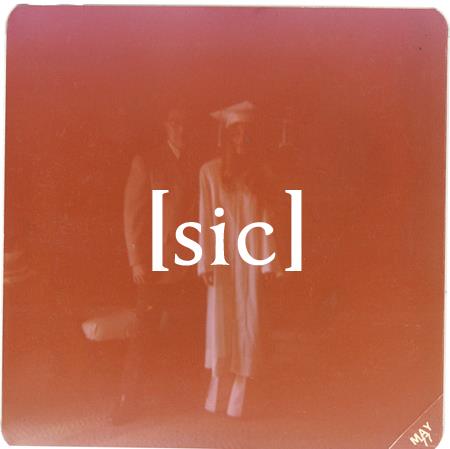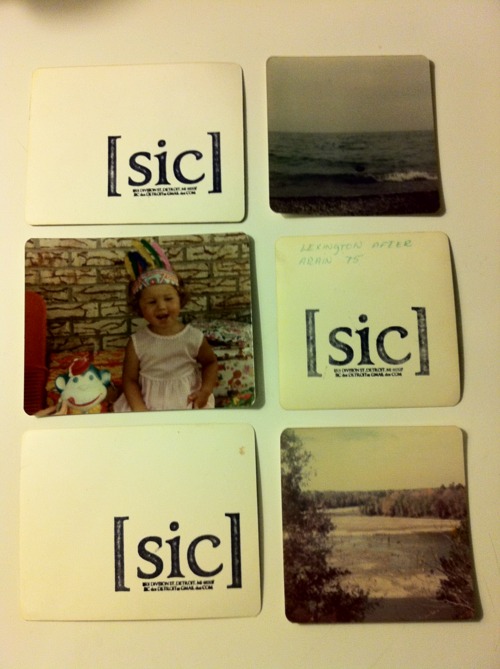
Detroit’s poetry movement now in motion
- Images provided by “[sic]” Achille Bianchi and Jonathan Rajewski
This poem is called “Punchline related to Ulysses by James Joyce,” read John Brown this past Saturday at the independent bookstore Leopold’s Books during the launch of “[sic],” Detroit’s freshest take on exposing literary talent to the city and the world. “[sic]” (also an editing term used to show that’s how it appears in the original copy) includes a series of self-published chapbooks and readings, such as the event at Leopold’s. The overall project, founded by Detroiters Achille Bianchi and Jonathan Rajewski, has a lighthearted feel along with a commitment to quality work. It seems that the duo also share a desire to unearth great stories. Before Rajewski introduced self-proclaimed non-writer John Brown, he explained that, in order to persuade the gentleman to participate in the project, he had to arrive at Avalon Bakery before 7 a.m. every day to meet. As a result, Brown, who does not use cellphones or e-mail, is featured in the first series of five chapbooks. Other authors involved with the project include Kresge Fellow Rachel Harkai, Mike Lala, curator of Fireside Follies from Brooklyn, and Spirit of Detroit Award recipient Charles Alexander. The launch event was enlivened by a man named Tommy Spaghetti playing the accordion and visuals by Detroit artists Dan Demaggio, Chris Turner and Rajewski. Amidst the excitement, I had a minute to catch up and ask the founders of “[sic]” a few questions to which they provided the beautiful and poetic answers below.
Vanessa Miller: Briefly, could you please share some insight about “[sic].”
Achille Bianchi: “[sic]” is a chapbook series that publishes authors from Detroit and abroad, and, at its foundation, seeks to spread literary talent. As amazing as the art and music scenes are in Detroit, the literary arts tend to get drowned out and there doesn’t seem to be a good, cohesive channel for independent authors to express themselves.
Jonathan Rajewski: Our website (currently a tumblr — sicdetroit.tumblr.com) will also feature video-readings online throughout the year.
VM: What is your role with “[sic]?”
AB: Jonathan and I share pretty much all of the duties equally in producing “[sic].” We both did design and layout, promotion, event coordination, distribution, research for printing, copy-editing, etc. [It] turned out to [be] a lot more work than we originally thought, but now we have templates made and most of the process down — the next volume should go pretty smoothly.
VM: What was the spark that brought “[sic]” together?
JR: The sheer enjoyment of reading excellent poets. Though, for me, there’s a brief historical context out of which “[sic]” emerges:
1. I started reading a lot of Neruda, Celan, Stevens, Rilke, etc, in university while studying Philosophy. I liked what Heidegger and Derrida have to say about it — Gadamer, too. I started reading more. I started caring more.
2. There is a fundamental problem with how we understand communication and language. With status feeds, text messages, acronyms and initialisms, some of us really believe we communicate more, that we can say more, more often. “[sic]” maintains we are further from language than ever before (forgive the spatial metaphor), in that we do not reflect enough upon what is being said or referred to.
3. I bought a chapbook in Paris this year (Jack Underwood’s) and knew instantly I wanted to do something like this in Detroit. One day it happened, because Achille is really smart and great at making things move, and I had a laundry list of poets I was anxious to publish. It helps we enjoy each other’s company.
AB: He (Jonathan) mentioned he had a friend who was a good poet. I said I knew of some people, too. We started scheming right then — about the shape, size, title — basically all the fun stuff. The real work came after. We kind of shaped the project as we went along, but we essentially just wanted to provide a venue for independent authors.
VM: The reading the other night had a great turnout. How do you feel about it, and what is the plan for future events?
AB: I loved it — it was fun, a good turnout and, outside of actually producing the chapbook, the event wasn’t really that much more work. It was an intimate space and was nice and toasty inside. The artwork from Jonathan, Chris Turner and Dan DeMaggio I feel it all integrated well. I personally liked having the art / installation / music aspect, too, because it felt like enriched almost. Like I said, we might start doing the readings more often, as it had a good turnout and there are really not a lot of readings, at least to my knowledge. I think Greg Lenhoff from Leopold’s sold some books, too, so he benefitted to, which is cool. We’ll probably stick to having the event there. Greg was really nice, laid back and accommodating, really great to work with.
JR: Thanks. I’m somewhere lingering between “I never saw that coming” and “I had a feeling Detroit would come out and usher us in.” I feel so excited to bring that much attention to so many known and unknown authors. The plan is to have more events. The 002 release will be even bigger. “[sic]” wants to continue to be a multidisciplinary event, featuring artists, musicians and local accomplishments and accomplishers. I want Vanessa Miller’s photography at the next one (seriously).
VM: How has the city of Detroit affected this process of writing and putting the project together? (Also, thanks Jonathan.)
JR: Detroit is continuously inspiring. This project gained so much momentum from the community support. Poetry connects generations of people and writers, from all sorts of backgrounds. The landscape certainly provokes a necessity to produce new work, new instances of creativity and re-appropriations of space. Detroit’s vast complexities produce an anxiety for which creativity is more pertinent than it would be nearly anywhere else in the United States.
AB: I would say Detroit inspires a lot, if not everything, that I do, think about, take action toward, etc. Had I never lived in Detroit, my life, I’m sure, would be vastly different. I think that really growing up here is 90 percent of who I am today. Now, as far as the project goes, I would say that the city inspires my writing and ideas far more than the actual process for this chapbook.
VM: Achille, can you give a little insight behind the writings in your chapbook?
AB: My chapbook is more mental musings rather than a cohesive work, which is ironic because that’s what I said I look for in our authors. I just liked the idea of making a book that tried to capture the changing seasons in Michigan and how they affect our memories and relationships. It’s kind of sad, I guess, but I really care for the nostalgia and progression of life, especially growing up in Detroit, Mich.
VM: Where will the books be available?
AB: So far, we’re starting off small: We are selling the books from the trunks of our cars (literally). We also have them, however, at Leopold’s Books and (Knight Arts grantee) Museum of Contemporary Art Detroit, and we’re still looking for another vendor in Detroit, as well as one or two in Ann Arbor. We’ll also have them available in Brooklyn, Paris and San Francisco.
VM: When can we expect the next release?
AB: We’re looking to release four volumes of “[sic],” 20 authors total. We have most of our authors picked for the next release, which will be just after the new year. We’re going to do a reading for each release, which will be quarterly. We had some really good feedback, though, so we might do readings more frequently than the releases.
Recent Content
-
Artsarticle ·
-
Artsarticle ·
-
Artsarticle ·

